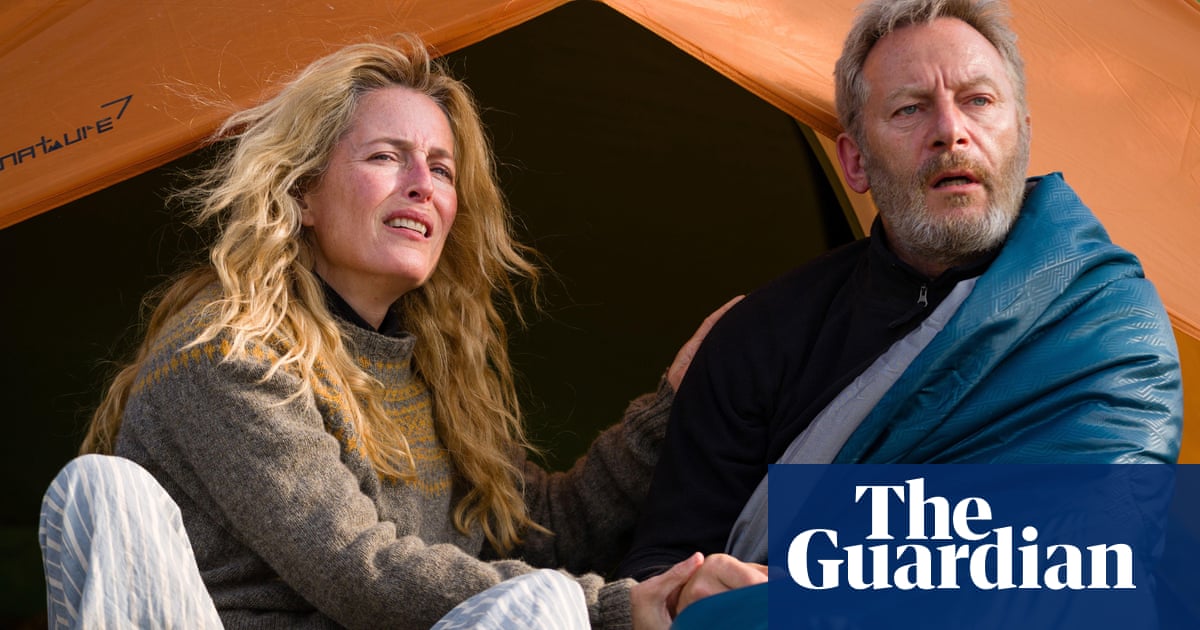‘I have played a lot of powerful, well-dressed women in my career,” says Gillian Anderson. They flash before your eyes: Margaret Thatcher (The Crown), Eleanor Roosevelt (The First Lady), Emily Maitlis (the Prince Andrew/Newsnight drama Scoop) – as well as the formidable sex therapist in the Netflix hit Sex Education, a role that led to her being inundated with dildos from over-enthusiastic fans. “These are all women in control of themselves and their environment. Any time I have an opportunity to steer against that, particularly lately, it’s of interest to me.”
There is steering in another direction, and then there is the screeching handbrake turn represented by her role in The Salt Path, adapted from Raynor Winn’s 2018 memoir of homelessness and hope along the coastline of England’s south-west. Playing Winn, Anderson is shown making a single teabag stretch for several cuppas, withdrawing the final £1.38 from her bank account, and warming her blistered feet by a pub fire. A typical day begins with her peeing in the undergrowth. It’s a far cry from Agent Scully in The X-Files.
Winn’s response to a double catastrophe in her life in 2013 was to embark on the lengthy South West Coast Path walk with her husband, Moth. The film’s opening scene shows the couple’s tent being flooded during a King Lear-level storm. A flashback then reveals how they ended up in this sorry, soggy state. A bad investment left them saddled with crippling debts and the couple lost the farm in Wales where they had brought up their now-adult children. While cowering in the hallway from bailiffs, Winn took inspiration from a cherished book glimpsed among their partly packed belongings: Five Hundred Mile Walkies, in which Mark Wallington recounts the trek he and his dog took around the south-west.
He must have miscalculated the journey, however. It is in fact 630 miles, including many steep ascents and descents. And as if penury and homelessness were not challenging enough, Moth had recently been diagnosed with a rare brain disease, corticobasal syndrome, and advised by doctors to rest. Stairs, he was told, would be particularly problematic.
Twelve years and those 630 miles later, Moth Winn is, miraculously, still alive. He is played in the film by Jason Isaacs, who sits beside his screen wife today in a London hotel room. Their contrasting body language is instantly revealing. The 56-year-old Anderson, friendly but with a casually authoritative aura, is perched side-saddle in her chair, one leg crossed away from me, so that she seems almost to be looking back over her shoulder in my direction as she speaks. Isaacs, 61, leans forward, elbows on knees, keen to get stuck in. It is as if they are still playing their parts from The Salt Path: Raynor Winn, with her patina of reserve and caution, and Moth, eager to make sure everyone else is comfortable, a people-pleaser even when the people aren’t worth pleasing, as some of those they meet on their travels manifestly are not. A passerby berates them for wild camping, beating their tent with his stick. In a scene that hasn’t made it from page to screen, Winn is humiliated by a woman who spots her scrambling on the ground for dropped coins and assumes she is drunk.
Despite those flashes of conflict, Winn had doubts about how her story would work on screen. “It’s about two people and a path,” she tells me from the home she and Moth now share in Cornwall. “I couldn’t grasp how that could be a film.” But Marianne Elliott, the acclaimed stage director of War Horse, Angels in America, and Company, makes her screen directing debut here and tells me she always saw The Salt Path as inherently cinematic. “Ray and Moth hardly talk on their walk,” she says. “They are carrying their trauma on their back, but then they slowly calm down and start to look up and engage with the majestic landscapes. And they are changed by it. It felt like nature was playing with them, like a wild beast – sometimes giving them beauty and wonder, and sometimes battering them cruelly. They were reformed by the elements, if you like.”
Playwright and screenwriter Rebecca Lenkiewicz, who adapted The Salt Path for the screen, says she saw nature as the key to unlocking the film version. “Any reservations were about the walking,” she says. “You know: how do we make walking dynamic for that amount of time? It felt like we needed almost to take the weather and the landscape as a character. It needed to be a film with a lot of silence. It’s not some chatty, walky comedy.”
Watching Isaacs trudging across English landscapes, however magnificent, feels incongruous after all those scenes of him suffering existential despair in luxurious five-star surroundings in the Thailand-set third season of The White Lotus. I assume he will be heartily sick of talking about the series by now, but it is he who brings up the similarity between the characters he plays. “They’re both men who lose everything. And they react in very different ways, which is a measure of who they are.”
His character in The White Lotus was prone to suicidal ideations. So, too, was the apparently upbeat Moth. “He laughs all the time, even when he’s describing the toll his disease has taken on him. But he felt suicidal on the walk. He and Ray were crippled with shame, and the future was this abyss for them. They hid that from one another. They constantly made each other laugh. Acting is a game of pretend, and that’s what they were both doing.”
What were Anderson’s first impressions of Raynor? “I was surprised at how guarded she was,” she says. “Of course, it must be strange: you’ve got two relatively famous actors who are going to play you showing up at your house. But it was interesting to encounter a certain steeliness. It was informative for me to see that.” “You can be quite steely,” Isaacs says. “You’ve got that in you.” “Oh, definitely,” she agrees. “I know that about myself.”
Having been surprised when her memoir was optioned, Winn says she was even more taken aback by the casting. “I remember thinking, ‘How is that going to work? How will someone so perfect and glamorous capture me in that raw state?’” Things got even more confusing when she told Moth the news. “He thought I meant Pamela Anderson.”
During the first meeting between the four of them, the Winns explained to the actors the details of how they packed, knowing that they couldn’t take more than what could be carried on their backs. “Then they put the tent up for us right there in the living room,” Isaacs says. “I’m not sure if I’d … ever … camped … before,” says Anderson, stringing the words out as though anticipating derision. “You’d never pitched a tent?” asks Isaacs in mild disbelief. “Not as far as I can remember,” she says. “I might have pitched one for my kids in the back garden.”
Isaacs says he is “all about climbing things, jumping off things, swimming through things. Canyons and stuff. I like extreme physical experiences. Even at my advanced age, I see something and I think, ‘That’d be fun to climb up. Or slide down.’ I’m still a 12-year-old boy trapped in a 100-year-old body.”
As a child, he went wild camping with his family in Wales. “We’d get woken by farmers. Or livestock.” Once, they parked in heavy fog on a small hill and pitched their tent. “You couldn’t see your hand in front of you. We woke up to find we’d camped on a roundabout.” Anderson gasps and claps her hands: “That’s such a good story!”
The Salt Path began life as a diary that Winn kept on the walk, and which she later wrote up as a gift for Moth – and, more urgently, as a way of preserving the experience for him as his memory began to fade. That diary spawned a Big Issue article and then a book, nominated for the Costa prize in 2018. The judges called it “an absolutely brilliant story that needs to be told about the human capacity to endure and keep putting one foot in front of another”.
The picture will doubtless reignite interest in the South West Coast Path, and attract more walkers after a recent downturn. To anyone tempted to wonder whether walking is having “a moment”, what with the film of The Salt Path following David Nicholls’s novel You Are Here (about a friendship that blooms on a 200-mile coast-to-coast hike across the north of England), it is as well to remember that what the Winns did was born out desperation. They found beauty and a kind of salvation, and the walk even seemed to help Moth to defy his doctors’ prognosis, but it was often a ghastly, hardscrabble journey.
“They were desperate and lonely and scared,” says Isaacs. “They wanted to avoid towns because they got treated badly there and they had no money to buy food. They were happier by themselves away from people. They experienced both sides of human nature: tremendous compassion and generosity but also abuse and neglect. They were frightened of the police and of anyone who would come along and dehumanise them just because they were homeless. Though the book itself was a love letter to Moth, there’s a marked lack of sentimentality when they speak about what happened. They got all kinds of different benefits from the walk but they still wanted a warm roof over their heads.”
One thing that is impossible to capture on screen, he says, is their persistent hunger. “It colours everything. We do our best to tell the story but that’s a physical ache. They would stand at cafe windows watching people eat.” Anderson is nodding along. “Ray talks in the book about pretending to eat, and how the fantasy of eating, the act of moving the mouth, does half the job,” she says.
Winn tells me that living below the breadline has altered her for ever. “It changes how you feel about material things,” she says. “Having let go of everything we had, possessions don’t concern me in the same way they did before. Anything that doesn’t enrich your life just gets in the way. The stuff we gather can easily start to control us.” Winn says her life is much as it ever was, though Moth now tires more easily, and requires extensive physiotherapy. “Except without the worry of paying the rent.”
As the author of several bestselling books, does she allow herself the occasional luxury these days? “I do,” she sighs. “Sometimes it’s nice to have the whole pasty instead of just half.”










